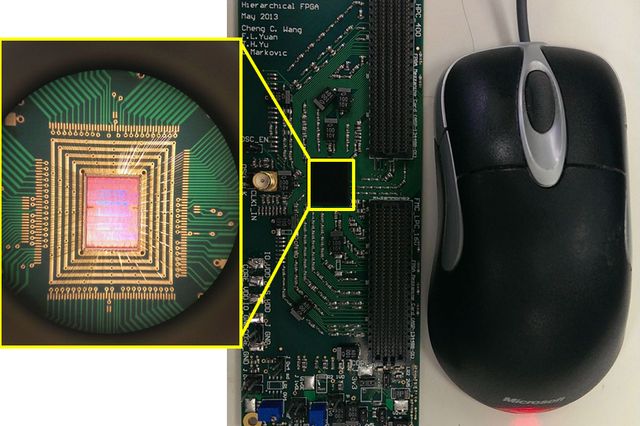Two engineering alumni redesign devices that power computers, cellphones
Many students dream of bridging the gap between academic achievement and entrepreneurial impact. Two recent graduates of the UCLA Henry Samueli School of Engineering and Applied Science are seeing that dream come true.
This month, Cheng C. Wang and Fang-Li Yuan, who earned Ph.D. degrees in electrical engineering in 2013 and 2014, respectively, won the top award at the world’s most prestigious conference on integrated circuits.
Cheng C. Wang, Dejan Markovic and Fang-Li Yuan. Wang and Yuan earned their Ph.D.s in electrical engineering. Professor Markovic was their advisor.
That same research helped them launch a new company. Wang and Yuan are the first two employees of Flex Logix Technologies, a Mountain View startup headed by veteran technology entrepreneur Geoff Tate, the founding chief executive of digital licensing and integrated circuits firm Rambus Inc.
Their innovation lies in reconfigurable hardware known within the semiconductor industry as field-programmable gate arrays (FPGAs), which power everyday devices ranging from computers and cellphones to the GPS devices in cars.
Yuan and Wang conceived of, developed and tested a new design of an FPGA. The design allows microprocessors to handle more complex tasks — for example, algorithm-intensive software applications such as digital signal processing, datacenter acceleration and high-speed networking — with greater flexibility while using less energy than today’s chips.
The key to their achievement is making integrated circuits reconfigurable, saving chip developers from spending years and tens of millions of dollars ensuring that their products will run smoothly alongside new applications or with increased power demands.
“The unique part of our technology is the integrated circuits,” Yuan said. “It’s not common for people to build a programmable hardware and software suite from scratch. We didn’t grab any existing IP (intellectual property) or free online templates. Instead, we figured out the core structure — the configuration circuitry — and made it functionally compatible to commercial FPGAs. “
The advantage for industry is not in reducing manufacturing costs, Wang explained. The design actually requires a fairly large silicon area on each chip, “and that silicon area is not cheap,” he said. “But what is more expensive in the chip business is time — the time it takes to get a product out to market and make sure it works as expected.”
This week, Wang and Yuan won the 2014 Lewis Winner Award for Outstanding Paper at the International Solid-State Circuits Conference held in San Francisco. The conference draws more than 3,000 people each year, among them, a veritable who’s who of leaders in the world of integrated circuits.
Kenneth C. Smith, awards chair for the conference and a professor emeritus of electrical engineering and computer science at the University of Toronto, said conference papers are ranked by hundreds of conference participants for technical excellence and presentation.
“In order to be considered outstanding, the paper must rank high in both categories,” Smith said. “In this case, a vast number of people thought it was an unusual and special paper.”
Wang and Yuan are lead authors on the paper. The principal investigator is Dejan Markovic, a professor of electrical engineering at UCLA and the Ph.D. advisor to Yuan and Wang. Tsung Han-Yu, who earned his Ph.D. from UCLA and has since joined chip maker Qualcomm, is a co-author.
Wang, 29, came with his family from Shanghai to Los Angeles when he was 11. He earned his bachelor’s degree at UC Berkeley, where Markovic was then a graduate student, and spent two years working for a Silicon Valley company that designed system-on-a-chip integrated circuits for home entertainment devices. He then came to UCLA for his graduate work. He helped found Flex Logix in March 2014.
Yuan, 31, earned his bachelor’s and master’s degrees at National Taiwan University, and then sought out UCLA Engineering because of the school’s strength in circuit design. After earning his Ph.D. in 2014, he joined Flex Logix in July.
Both researchers were awarded the Distinguished Ph.D. Dissertation Award in Electrical Engineering at UCLA. Yuan was named a Broadcom Fellow while studying at UCLA.
In doing the research, the team developed five chips with variations of the new design and did extensive testing of software to make sure the chip was programmable. Early on in the research, they said, they drew inquiries from semiconductor companies, and they knew that their work would have impact well beyond the walls of Markovic’s lab.
“The goal for a lot of Ph.D. students is to do some research, earn a degree and get out,” said Wang. “That wasn’t our goal. We knew this was something that we were going to keep working on for many years.”
They worked with UCLA Engineering’s Institute for Technology Advancement and the UCLA Office of Intellectual Property, which assists student and faculty researchers in securing patents, forging licensing agreements and promoting new technologies developed at UCLA.
During FY2013-14, a total of 97 U.S. patents were issued for UCLA-related inventions, 86 new UCLA inventions were licensed to companies, and 22 startups were launched to commercialize UCLA discoveries and innovations, according to the UCLA Office of Intellectual Property.
Markovic credits Yuan and Wang for their commitment. “It takes a special mindset to say, ‘Let’s stretch our imaginations, intellects and computing resources to the fullest extent possible,’” he said.
“Two strong factors are driving the need for this research — the economic constraints of chip creation and improving the efficiency of your device,” Markovic said. “This work might allow us to restore the cycle of innovation in chip design that has been decimated by the skyrocketing cost of making new chips in advanced technologies.”


